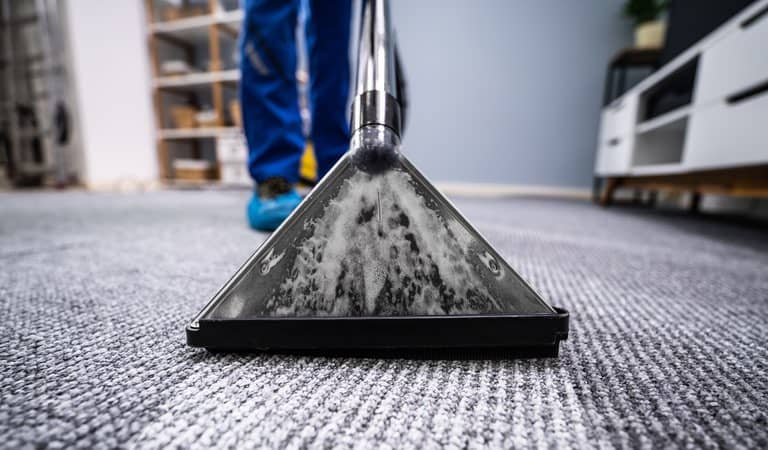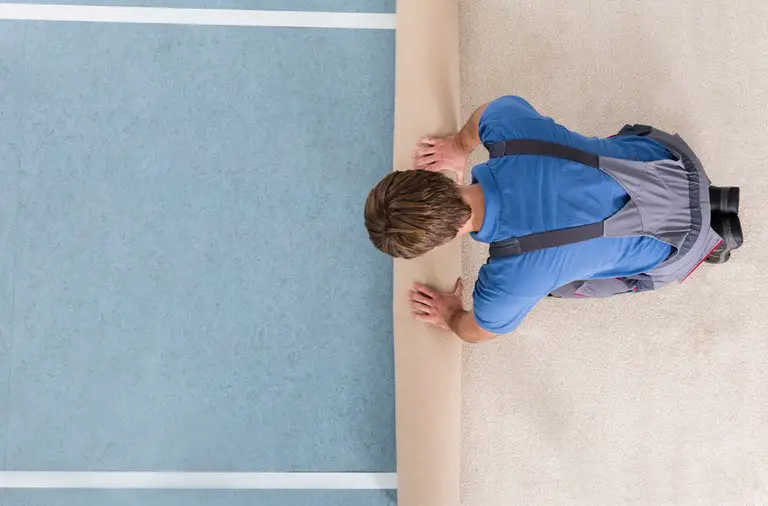Is the carpet in your rental property looking a little worse for wear? If so, you might be wondering who is responsible for paying for the carpet replacement. There are a few factors that come into play when it comes to deciding whether or not landlords can charge tenants for carpet damage.
I’ll go over all of the important details in this blog post, so you can make an informed decision about what to do next.
As a general rule, landlords can charge the tenant for carpet replacement if the tenant is responsible for the damage. Landlords cannot pass the costs of a new carpet onto the tenant if the carpet has become worn and tired due to normal wear and tear.
Carpets are usually one of the most expensive items in a buy-to-let property, and they can suffer a lot of wear and tear over time.
When tenants move into a rental property, the condition of the carpet is often noted in the inventory. If the carpets are new or in good condition, they may be asked to sign an agreement that stipulates that they will replace them if they are damaged during the tenancy.
Contents
What Is The Difference Between Wear and Tear And Damage?
Landlords cannot charge tenants for replacing carpets or other items in a rental property due to normal wear and tear.
But what is the difference between wear and tear and damage?
Normal wear and tear is damage that naturally occurs as a result of living in a property. It is important to note that normal wear and tear occurs regardless of how well the property is maintained. Over time, carpeting will become lightly stained, faded, and worn.
This is considered to be normal wear and tear, and the landlord cannot charge the tenant for this type of damage.
Damage, on the other hand, is somethings that shortens the lifespan of an item before its expected lifespan. For example, if a tenant spills a dark-coloured liquid on the carpeting and doesn’t attempt to clean it up, this can cause a permanent stain.
Or if the tenant doesn’t remove their muddy shoes before walking on the carpets, this can also cause lasting damage. It is up to the tenant to maintain and repair any damage that is not the result of normal wear and tear.
In most cases, landlords should only charge tenants for damage if it has occurred within the expected lifespan. If the carpet is simply worn and needs to be replaced, then it’s not the tenant’s responsibility to pay for that.
Depreciation is also a factor that landlords should consider when determining how much to charge tenants for a replacement carpet.
An amortisation table can be used to calculate the amount of depreciation that has occurred.
Simply enter the original cost, set the interest rate to 0% and then enter the number of years it was expected to last. You can then easily work out how much the carpet was still worth at the time it was damaged.
The expected lifespan of a carpet will vary depending on the quality and other factors. I have written an article about the life expectancy of a carpet in a rental property which you may find useful.
If a tenant causes extensive damage to the carpeting within a short period of time, the landlord may be able to charge them for replacement costs.
Can A Landlord Charge For Carpet Cleaning?
Landlords are able to charge for carpet cleaning, but it is typically something that is negotiated between the landlord and tenant before signing the tenancy agreement.
In some cases, the landlord may require the tenant to pay for professional carpet cleaning at the end of the tenancy. So it’s important for both parties to check and understand what will be expected at the end of the tenancy before the agreement is signed.
The arrangements will likely depend on a number of factors. For example, if the landlord is letting a property to a tenant with a cat or a dog, and the property is fully furnished, then the landlord might stipulate that a professional clean will be required at the end of the tenancy.

Regardless, the carpets should be clean when the tenant moves into the property, and when they move out of the property. If the tenant has maintained the carpet during their tenure and they clean it when they move out, the landlord will not have grounds to seek the cleaning services from a third party and attempt to pass the costs to the tenant.
What Is Betterment?
Betterment is the process of making improvements to a rental property that increase its value and make it more attractive to potential tenants. This can include repairs, upgrades, or remodelling projects. The goal of betterment is to improve the property’s condition and raise its market value.
The answer to this question regarding carpets, would be to fit new carpets that are better quality than the carpets that are already fitted.
Landlords cannot pass the costs of betterment onto their tenants. If the tenant has damaged a carpet and is responsible for the replacement costs, they can only be charged on a like-for-like basis.
What Happens When The Tenant And Landlord Don’t Agree?
When a tenant and landlord disagree about the amount of damages, both parties have the right to request an independent assessment from an arbitrator. All tenancy deposit protection schemes provide this service.
Any disputes can be sent to a professional and impartial adjudicator and they will decided how much should be awarded to each party based on the evidence that is submitted.
To deduct money from a tenants security deposit, the landlord will need to prove that the value of the carpet has been diminished by the tenants actions during their tenancy.
This can be difficult to do, as it’s not always easy to quantify the value of a carpet. In some cases, it may come down to expert opinion.
Disputes are normally resolved within a matter of a couple of weeks.
This is why it is important for both the tenant and landlord to have a detailed copy of inventory and inspection report before the tenancy starts.
If there is any disagreement about the condition of the property at the end of the tenancy, these records will be very helpful in resolving the issue.
Does A Landlord Have To Replace The Carpet?
The landlord is responsible for providing and maintaining the carpet in the rental property. If the carpet is damaged or needs to be replaced, the tenant should notify the landlord so that they can take care of it.
In most cases, the landlord will be required to replace the carpet at their own expense unless the tenant has caused damage to it.
Can Tenants Replace the Carpet in Their Rental on Their Own?
If a tenant wishes to purchase a new carpet, they should first contact the landlord. Providing the new carpet is of a similar quality to the one that is being replaced, most landlords probably wouldn’t have a problem with this.
Also, most rental agreements will specify who is responsible for what when it comes to the condition of the rental property. In most cases, the landlord is responsible for major repairs and upkeep, while the tenant will be responsible for any damages.
So depending on the reason for the tenant wanting a new carpet, it may be the responsibility of the landlord to replace it anyway.

